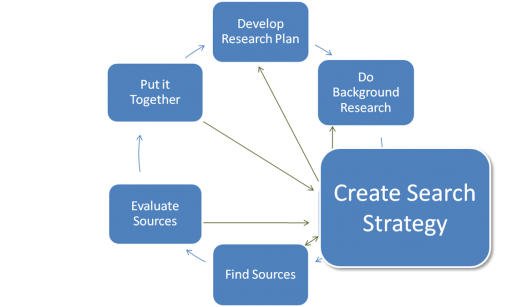What is your strategy for finding the best resources?
If your professor has told you what sources you need (aka: 1 book source, 3 popular articles, 1 scholarly article), click to the next section.
If you are allowed to choose your own sources, consider the following:
- Books tend to have more general information, more background information, and to be written for a general audience
- Scholarly articles tend to be written with up-to-the minute information for an expert audience, and focused on a very narrow topic.
- Magazine articles tend to be written for a general audience, up-to-date, and broad in covering ideas.
Now that you have background information, start to narrow the focus of your research. What interests you?
Start to brainstorm possible keywords related to your topic. Try to come up with either single words or two word phrases that encapsulate your topic. See the library's guide to picking a topic for more information.
Search the library catalog for a general topic, such as “African American” and “encyclopedia”
You can also look at the subject-based research guides to see if a librarian has recommended a specific online or print place to start your research.
Reference books are shelved in a special area of the library. If you need help locating one, head to the reference desk.
Online reference sources are usually made up of articles pulled out of academic dictionaries and encyclopedias. Start at the reference database page to find different library sources. Here are a couple of options to help you get started:
- Credo and Gale provide definitions of different academic subjects and concepts.
- CQ Researcher and Issues and Controversies both discuss current events, with lots of data and background information.
- Even looking at a Wikipedia article will get you a sense of the state of the subject: basic facts and current developments.
- There are other specialty reference sources that you can use, depending on your topic. Skim through the descriptions of the databases listed on that page to find the best match.
